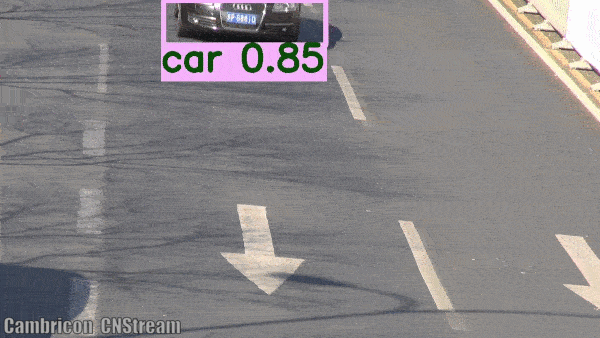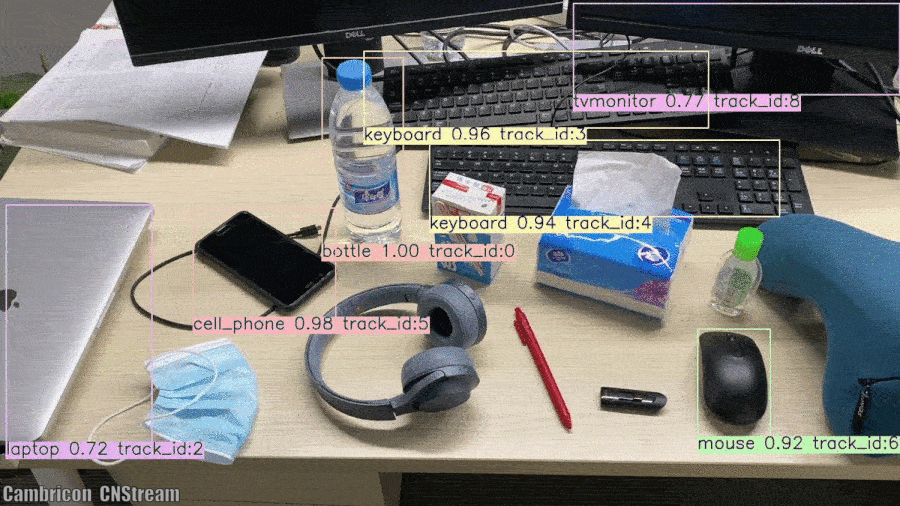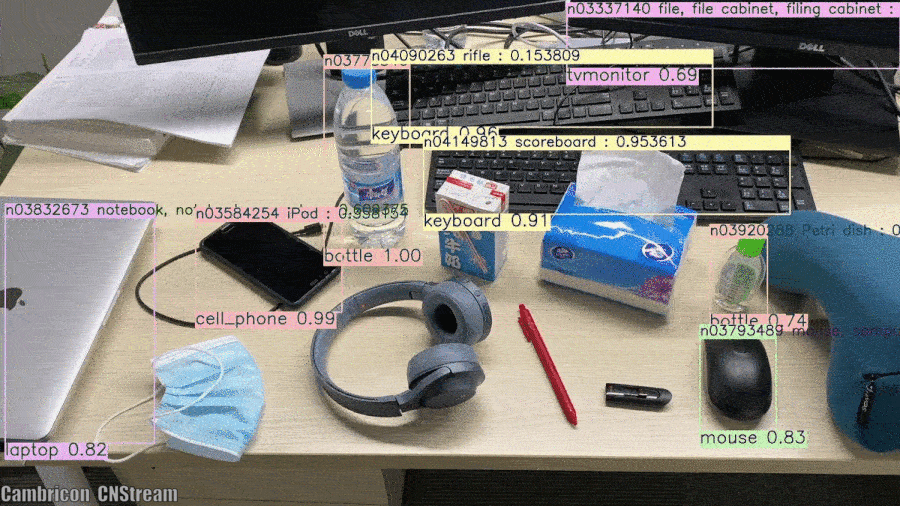CNStream is a streaming framework with plug-ins. It is used to connect other modules, includes basic functionalities, libraries, and essential elements.
CNStream provides the following plug-in modules:
- source: Supports RTSP, video file, and images(H.264, H.265, and JPEG decoding.)
- inference: MLU-based inference accelerator for detection and classification.
- osd (On-screen display): Module for highlighting objects and text overlay.
- encode: Encodes on CPU.
- display: Display the video on screen.
- tracker: Multi-object tracking.
- rtsp_sink:Push RTSP stream to internet
- ipc: Make pipeline across process
CNStream depends on the CNCodec library and the CNRT library which are packed in Cambricon neuware package. Therefore, the lastest Cambricon neuware package is required. If you do not have one, please feel free to contact with us. Our mailbox: [email protected]
dpkg -i neuware-mluxxx-x.x.x_Ubuntuxx.xx_amd64.deb
cd /var/neuware-mluxxx-x.x.x
dpkg -i cncodec-xxx.deb cnrt_xxx.deb yum -y install neuware-mluxxx-x.x.x.el7.x86_64.rpm
cd /var/neuware-mluxxx-x.x.x
yum -y install cncodec-xxx.rpm cnrt-xxx.rpmAfter that, Cambricon dependencies that CNStream needed are installed at path '/usr/loacl/neuware'.
Please make sure you must not install cnstream_xxx.deb or cnstream-xxx.rpm.
This section introduces how to quickly build instructions on CNStream and how to develop your own applications based on CNStream. We strongly recommend you execute pre_required_helper.sh to prepare for the environment. If not, please follow the commands below.
Before building instructions, you need to install the following software:
- OpenCV2.4.9+
- GFlags2.1.2
- GLog0.3.4
- Cmake2.8.7+
- SDL22.0.4+ // If build_display=ON
- FFmpeg2.8 3.4 4.2
If you are using Ubuntu or Debian, run the following commands:
OpenCV2.4.9+ >>>>>>>>> sudo apt-get install libopencv-dev
GFlags2.1.2 >>>>>>>>> sudo apt-get install libgflags-dev
GLog0.3.4 >>>>>>>>> sudo apt-get install libgoogle-glog-dev
Cmake2.8.7+ >>>>>>>>> sudo apt-get install cmake
SDL22.0.4+ >>>>>>>>> sudo apt-get install libsdl2-devIf you are using Centos, run the following commands:
OpenCV2.4.9+ >>>>>>>>> sudo yum install opencv-devel.x86_64
GFlags2.1.2 >>>>>>>>> sudo yum install gflags.x86_64
GLog0.3.4 >>>>>>>>> sudo yum install glog.x86_64
Cmake2.8.7+ >>>>>>>>> sudo yum install cmake3.x86_64
SDL22.0.4+ >>>>>>>>> sudo yum install SDL2_gfx-devel.x86_64After finished prerequisites, you can build instructions with the following steps:
-
Run the following command to save a directory for saving the output.
mkdir build # Create a directory to save the output.A Makefile is generated in the build folder.
-
Run the following command to generate a script for building instructions.
cd build cmake ${CNSTREAM_DIR} # Generate native build scripts.
Cambricon CNStream provides a CMake script (CMakeLists.txt) to build instructions. You can download CMake for free from http://www.cmake.org/.
${CNSTREAM_DIR}specifies the directory where CNStream saves for.cmake option range default description build_display ON / OFF ON build display module build_ipc ON / OFF ON build ipc module build_encode ON / OFF ON build encode module build_inference ON / OFF ON build inference module build_osd ON / OFF ON build osd module build_rtsp_sink ON / OFF ON build rtsp_sink module build_source ON / OFF ON build source module build_track ON / OFF ON build track module build_modules_contrib ON / OFF ON build contributed modules build_tests ON / OFF ON build tests build_samples ON / OFF ON build samples RELEASE ON / OFF ON release / debug WITH_FFMPEG ON / OFF ON build with FFMPEG WITH_OPENCV ON / OFF ON build with OPENCV WITH_FREETYPE ON / OFF OFF build with FREETYPE WITH_RTSP ON / OFF ON build with RTSP -
If you want to build CNStream samples: a. Run the following command:
cmake -Dbuild_samples=ON ${CNSTREAM_DIR}b. If wanna cross compile, please follow command to:
cmake -DCMAKE_TOOLCHAIN_FILE=${CNSTREAM_DIR}/cmake/cross-compile.cmake ${CNSTREAM_DIR}
Note: you need to configure toolchain by yourself in cross-compile.cmake and cross-compile gflags, glog, opencv, ffmpeg and install them into ${CNSTREAM_DIR}
take MLU220_SOC as example:
cmake ${CNSTREAM_DIR} -DCMAKE_TOOLCHAIN_FILE=${CNSTREAM_DIR}/cmake/cross-compile.cmake -Dbuild_tests=OFF -Dbuild_track=OFF -DWITH_TRACKER=OFF -DENABLE_KCF=OFF -DMLU=MLU220_SOC
-
Run the following command to build instructions:
make
-
If wanna install CNStream's head files and libraries to somewhere, please add
CMAKE_INSTALL_PREFIXto cmake command as below:cmake {CNSTREAM_DIR} -DCMAKE_INSTALL_PREFIX=/path/to/install make make install
| Classification | Object Detection |
|---|---|
 |
 |
| Object Tracking | Secondary Classification |
|---|---|
 |
 |
This demo shows how to detect objects using CNStream. It includes the following plug-in modules:
- source: Decodes video streams with MLU, such as local video files, RTMP stream, and RTSP stream.
- detector: Neural Network inference with MLU.
- osd: Draws inference results on images.
- displayer: Displays inference results on the screen.
In the run.sh script, detection_config.json is set as the configuration file. In this configuration file, resnet34_ssd.cambricon is the offline model used for inference, which means, the data will be fed to an SSD model after decoding. And the results will be shown on the screen.
In addition, see the comments in cnstream/samples/demo/run.sh for details.
Also there are several demos as located under classification, detection, track, secondary, rtsp etc.
To run the CNStream sample:
-
Follow the steps above to build instructions.
-
Run the demo using the list below:
cd ${CNSTREAM_DIR}/samples/demo ./run.sh
You should find a sample from samples/example/example.cpp that helps developers easily understand how to develop an application based on CNStream pipeline.
Modify the files.list_video file, which is under the cnstream/samples/demo directory, to replace the video path. Each line represents one stream. It is recommended to use an absolute path or use a relative path relative to the executor path.
CNStream Read-the-Docs or Cambricon Forum Docs
Check out the Examples page for tutorials on how to use CNStream. Concepts page for basic definitions
Discuss - General community discussion around CNStream